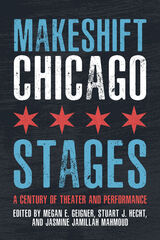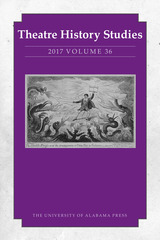2 books about Epplett, Shannon

Makeshift Chicago Stages
A Century of Theater and Performance
Edited by Megan E. Geigner, Stuart J. Hecht, and Jasmine Jamillah Mahmoud
Northwestern University Press, 2021
Since Chicago’s founding, theater has blossomed in the city’s makeshift spaces, from taverns to parks, living rooms to storefronts. Makeshift Chicago Stages brings together leading historians to share the history of theater and performance in the Second City. The essays collected here theorize a regional theater history and aesthetic that are inherently improvisational, rough-and-tumble, and marginal, reflecting the realities of a hypersegregated city and its neighborhoods. Space and place have contributed to Chicago’s reputation for gritty, ensemble-led work, part of a makeshift ethos that exposes the policies of the city and the transgressive possibilities of performance.
This book examines the rise and proliferation of Chicago’s performance spaces, which have rooted the city’s dynamic, thriving theater community. Chapters cover well‑known, groundbreaking, and understudied theatrical sites, ensembles, and artists, including the 1893 Columbian Exposition Midway Plaisance, the 57th Street Artist Colony, the Fine Arts Building, the Goodman Theatre, the Federal Theatre Project, the Kingston Mines and Body Politic Theaters, ImprovOlympics (later iO), Teatro Vista, Theaster Gates, and the Chicago Home Theater Festival. By putting space at the center of the city’s theater history, the authors in Makeshift Chicago Stages spotlight the roles of neighborhoods, racial dynamics, atypical venues, and borders as integral to understanding the work and aesthetics of Chicago’s artists, ensembles, and repertoires, which have influenced theater practices worldwide. Featuring rich archival work and oral histories, this anthology will prove a valuable resource for theater historians, as well as anyone interested in Chicago’s cultural heritage.
This book examines the rise and proliferation of Chicago’s performance spaces, which have rooted the city’s dynamic, thriving theater community. Chapters cover well‑known, groundbreaking, and understudied theatrical sites, ensembles, and artists, including the 1893 Columbian Exposition Midway Plaisance, the 57th Street Artist Colony, the Fine Arts Building, the Goodman Theatre, the Federal Theatre Project, the Kingston Mines and Body Politic Theaters, ImprovOlympics (later iO), Teatro Vista, Theaster Gates, and the Chicago Home Theater Festival. By putting space at the center of the city’s theater history, the authors in Makeshift Chicago Stages spotlight the roles of neighborhoods, racial dynamics, atypical venues, and borders as integral to understanding the work and aesthetics of Chicago’s artists, ensembles, and repertoires, which have influenced theater practices worldwide. Featuring rich archival work and oral histories, this anthology will prove a valuable resource for theater historians, as well as anyone interested in Chicago’s cultural heritage.
[more]

Theatre History Studies 2017, Vol. 36
Edited by Sara Freeman
University of Alabama Press, 2017
A peer-reviewed journal of theatre history and scholarship published annually since 1981 by the Mid-American Theatre Conference.
Theatre History Studies is devoted to research in all areas of theatre studies, with special interest in archival research, historical documentation, and historiography. Many issues feature a special section curated around a special theme or topic; for 2017 that special section focus on histories of new writing for the theatre.
Featured in THEATRE HISTORY STUDIES 2017, VOLUME 36
Theatre History Studies is devoted to research in all areas of theatre studies, with special interest in archival research, historical documentation, and historiography. Many issues feature a special section curated around a special theme or topic; for 2017 that special section focus on histories of new writing for the theatre.
Featured in THEATRE HISTORY STUDIES 2017, VOLUME 36
- “Resisting Arlecchino’s Mask: The Case of Marcello Moretti” by Gabrielle Houle
- “Making Space for Performance: Theatrical-Architectural Nationalism in Postindependence Ghana” by David Afriyie Donkor
- “Preparing Boys for War: J. M. Barrie’s Peter Pan Enlists in World War I’s ‘Great Adventure’” by Laura Ferdinand Feldmeyer
- “Not Just Rock ‘n’ Roll: Chicago Theatre, 1984–1990” by Julie Jackson
- “New Writing and Theatre History” by Sara Freeman
- “New Plays in New Tongues: Bilingualism and Immigration at the New Italian Theatre in France” by Matthew McMahan
- “The Waterloo Summer of the Prince of Wales’s Theatre: New Writing, Old Friends, and Early Realism in the Victorian Theatre” by Shannon Epplett
- “Chekhov’s Three Sisters: A Proto-Poststructuralist Experiment” by Sarah Wyman
- “Historicizing Shakesfear and Translating Shakespeare Anew” by Lezlie C. Cross
- “A New Noble Kinsmen: The Play On! Project and Making New Plays Out of Old” by Martine Kei Green-Rogers and Alex N. Vermillion
- “Making New Theatre Together: The First Writers’ Group at the Royal Court Theatre and Its Legacy Within the Young Writers’ Programme” by Nicholas Holden
- “New Writing in a Populist Context: A Play,a Pie, and a Pint” by Deana Nichols
- “American Playwriting and the Now New” by Todd London
- The Robert A. Schanke Award-Winning Essay: “Black Folk’s Theatre to Black Lives Matter: The Black Revolution on Campus” by La Donna L. Forsgren
[more]
READERS
Browse our collection.
PUBLISHERS
See BiblioVault's publisher services.
STUDENT SERVICES
Files for college accessibility offices.
UChicago Accessibility Resources
home | accessibility | search | about | contact us
BiblioVault ® 2001 - 2024
The University of Chicago Press









